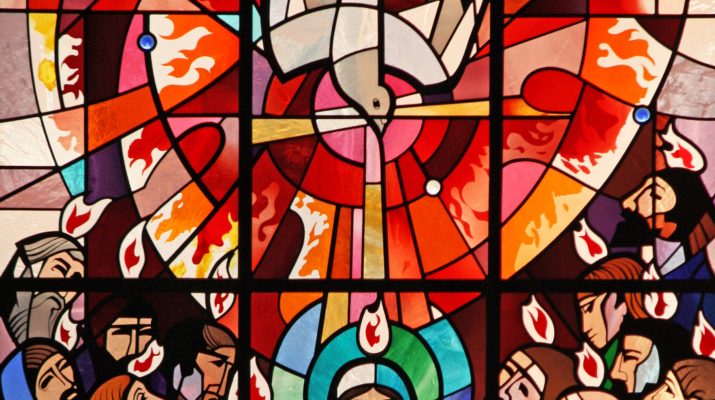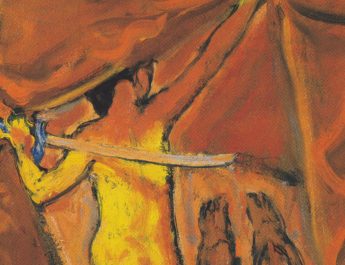Acts 2:1-21
Narrative Lectionary 346
1 When the day of PentecostA had come,B they were all together in one place. 2 And suddenlyC from heavenD there came a soundE
A “Pentecost” = pentekoste. 3x in NT. From pentekonta (fifty); {from pente (five) + deka (ten or -teen)}. This is fiftieth, used specially for Pentecost, the fiftieth day after Passover.
B “come” = sumpleroo. 3x in NT. From sun (with, together with) + pleroo (to fill, make full or complete; properly, filling something up to the maximum extent or individual capacity; used figuratively for furnish, influence, satisfy, finish, preach, perfect, and fulfill); {from pleres (to be full, complete, abounding in, occupied with)}. This is to fill entirely, a boat swamped with water, or fulfill. It can also be come or approach.
C “suddenly” = aphno. 3x in NT. Perhaps from aphanes (invisible, hidden, not apparent); {from a (not, without) + phaino (to bring light, cause to appear, shine, become visible or clear); {perhaps from phos (light, radiance; light literal or figurative)}}. This is suddenly or unawares.
D “heaven” = ouranos. May be related to oros (mountain, hill) with the notion of height. This is the air, the sky, the atmosphere, and heaven. It is the sky that is visible and the spiritual heaven where God dwells. Heaven implies happiness, power, and eternity.
E “sound” = echos. 4x in NT. From eche (noise or sound). This is a loud sound, roaring, or echo. It can also be a report, rumor, or fame. This is where the word “echo” comes from.
like the rushF of a violentG wind,H and it filledI the entireJ houseK where they were sitting.L
F “rush” = phero. This is to bear, bring, lead, or make known publicly. It is to carry in a literal or figurative sense
G “violent” = biaios. 1x in NT. From bia (strength, force, violence). This is violent, strong, or mighty.
H “wind” = pnoe. 2x in NT. From pneo (to blow, breath, breathe hard). This is breath, blowing, gust, or wind.
I “filled” = pleroo. Related to “come” in v1. See note B above.
J “entire” = holos. This is whole, complete, or entire. It is a state where every member is present and functioning in concert. This is the root of the word “whole.”
K “house” = oikos. This is house – the building, the household, the family, descendants, the temple.
L “sitting” = kathemai. From kata (down, against, throughout, among) + hemai (to sit). This is to sit, be enthroned, or reside.
3 DividedM tongues,N as of fire,O appearedP among them, and a tongue rested on each of them.
M “divided” = diamerizo. 12x in NT. From dia (through, across to the other side, thoroughly) + merizo (to divide, part, share, distribute, assign; figuratively, to differ); {from meros (part, share, portion figurative or literal); from meiromai (to get your share, receive one’s allotment)}. This is to divide up, distribute, or share. Figuratively, it can mean dissension.
N “tongues” = glossa. Root refers to a point that sticks out. This is tongue ina literal sense, but can also refer to language or a nation that speaks a different language. Figuratively, it can also refer to speaking in tongues or speech inspired by the Spirit.
O “fire” = pur. This is fire, lightning, heat from the sun. Figuratively, it can refer to strife or trials.
P “appeared” = horao. To see, perceive, attend to, look upon, experience. Properly, to stare at and so implying clear discernment. This, by extension, would indicate attending to what was seen and learned. This is to see, often with a metaphorical sense. Can include inward spiritual seeing.
4 All of them were filledQ with the HolyR SpiritS and beganT to speak in other languages,U as the Spirit gave them ability.V
Q “filled” = pleitho. This is to fill to the highest level possible – to accomplish, supply, or complete.
R “Holy” = hagios. From hagnos (holy, sacred, pure ethically, ritually, or ceremonially; prepared for worship, chaste, unadulterated, pure to the core; undefiled by sin; figurative for innocent, modest, perfect). God is totally different from humanity and thus set apart. That which is consecrated to worship God (elements of worship) or to serve God (as the saints) are holy because they are now set apart for God’s purposes. Holy because important to God. This is sacred physically, pure. It can be morally blameless or ceremonially consecrated.
S “Spirit” = pneuma. Related to “wind” in v1. From pneo (see note H above). This is wind, breath, or ghost. A breeze or a blast or air, a breath. Figuratively used for a spirit, the human soul or part of us that is rational. It is also used supernaturally for angels, demons, God, and the Holy Spirit. This is where pneumonia comes from.
T “began” = archomai. From archo (to rule, begin, have first rank or have political power). This is to begin or to rule.
U “languages” = glossa. Same as “tongues” in v3. See note N above.
V “ability” = apophtheggomai. Related to “suddenly” in v2. 3x in NT. From apo (from, away from) + phtheggomai (to speak out loud; can also be to speak in a way that cannot be understood or generally to speak out); {related to pheggos (light, radiance, splendor); related to phos (see note C above)}.This is to declare, pronounce, or speak clearly.
Image credit: “Pentecost” at St Aloysius’ church in Somers Town, London – photo by Lawrence OP, 2008.




